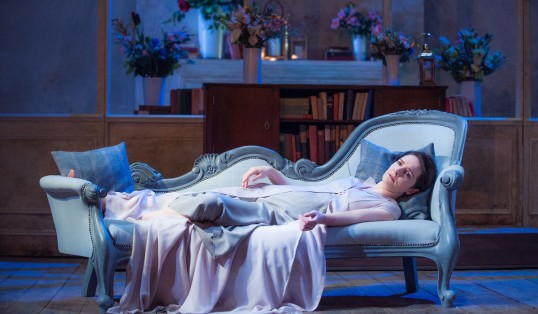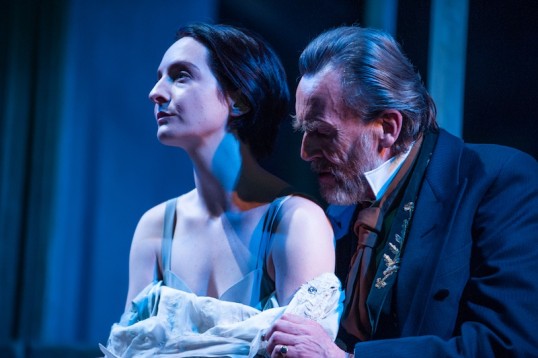Hedda Gabler
✭✭✭✩✩ Mixed success
Royal Lyceum Theatre: Fri 20 Mar – Sat 11 Apr 2015
Although considered and intelligent in its conception, the Lyceum’s production of Henrik Ibsen’s Hedda Gabler is too uneven to convince entirely.
Ibsen’s depiction of the former Ms Gabler, now married to the naïve, unprepossessing academic Tesman, and her struggles to find some meaning or fulfilment, has lent itself to countless different readings and interpretations.
Ibsen is always praised as the founder of realistic drama, but his later work is imbued with heavy symbolism and poetry, which is as important as any attempt at realistic depictions of human situations. This production, using a new (2005) version by Richard Eyre, certainly attempts to emphasise those symbolic elements – and not always successfully.
The opening, with Hedda sleeping fitfully on the sofa, then her servant Berthe (Vari Sylvester) and Tesman’s Aunt Julia (Sally Edwards) coming and going with haunted looks before a word is spoken, is one of the most effective parts of the production. Claire McKenzie’s eerie sound design and Simon Wilkinson’s lighting both help to create an oppressive, ominous mood, as they do throughout.
Jean Chan’s set also suggests a mood at the outset that is paradoxically both airy and claustrophobic. However, this set is not quite up to the demands placed on it later. Effects with moving walls may be designed to reinforce the feeling of oppression, but lead to some frustrating moments for the performers, as the various doors do not quite behave themselves.
The attempt to create a mood something beyond the everyday is extended to the cast, which leads to an uneven set of performances. Some of the acting is a little too mannered, and the second half comes too close to melodrama for comfort. This only serves to dissipate the atmosphere that has been so carefully built up, and the moments that should be the most tense suffer correspondingly.
false bonhomie
Nicola Daley’s Hedda is suitably glacial, with her fixed smile constantly on the verge of cracking as she seeks to repress whatever is going on inside. There is a definite steel and charm here, but in the end, the characterisation seems just too mysterious. Director Amanda Gaughan seems keen to avoid any of the established psychological or political interpretations of Hedda, but the result is someone whose motives seem opaque and inscrutable.
Benny Young’s oily Judge Brack is in danger of going too far the other way, with the definite feeling that at times he is about to start twiddling his moustache. It seems inconceivable that other characters would be taken in by the false bonhomie of such an oily figure, but Young manages to find enough emotional coherence to make the character work.
Similarly, Lewis Hart is in danger of overdoing Tesman’s enthusiastic naivete, but retains a daffy dignity. Jack Tarlton, as Hedda’s onetime suitor (and Tesman’s professional rival) Lovborg, overcomes a spooky resemblance to Lenin in his facial hair to turn in a compelling portrait of a man unable to successfully battle his inner demons.
Jade Williams, as Tesman’s ‘old flame’ Mrs Elvsted, has a breathy, put-upon quality that stays on the right side of annoying, while Sally Edwards as Aunt Julia suffers more than most from the sudden lurch into melodrama towards the end.
With costumes that seem to combine the fashions of the end of the 19th century with a more modern-day feel, the production has an almost effortless contemporary relevance. This is extended to Richard Eyre’s translation, which while serviceable, makes too much use of flat, modern-day idiom to ever achieve the necessary poetry.
There are moments when the production threatens to soar – notably that opening, and between scenes in the first half, where Hedda is dressed by the other characters in an otherworldly, dance-like sequence for which movement director EJ Boyle deserves great credit. However, too much of the rest remains resolutely earthbound.
Running time 2 hours 15 mins (including interval)
Royal Lyceum Theatre, Grindlay Street EH3 9AX
Run ends Sat 11 April 2015
Tuesdays – Saturdays: 7.30pm; Wednesdays and Saturdays: 2pm
Tickets from http://lyceum.org.uk/whats-on/production/hedda-gabler
Richard Eyre’s adaptation was first performed at the Almeida Theatre in London. The script is available to buy on Amazon.
ENDS





















